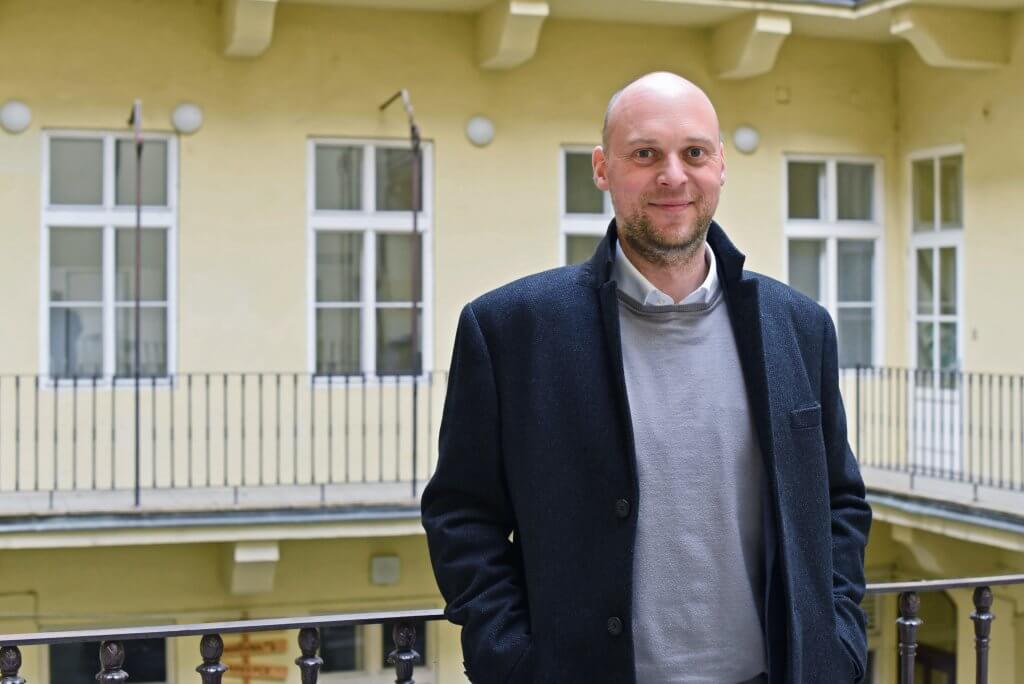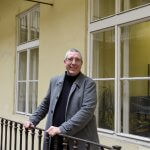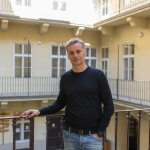Michal Parízek: Academic work is not only about teaching and research, we should pass on our knowledge further

What research projects is he currently working on? How does his experience of studying abroad influence his teaching style? And why does he think it is important to develop the so-called third role of the university?
Read our interview with Michal Parízek from the Institute of Political Studies. The interview was recorded as part of the De Facto podcast. This episode is hosted by doc. Alice Němcová Tejkalová.

Alice Němcová Tejkalová: Since last year, you have been researching within the Horizon Europe project on how the European Union could contribute to the functional governance of large global institutions. What have you gathered so far for this project? I know you’re just starting out, but what do you think are some of the key theses? Why do we need to defend multilateralism?
Michal Parízek: Currently, international politics, global governance and functioning of major global institutions in general are undergoing a major transformation. They are under enormous pressure, the greatest since the end of the Cold War. The European Union, or even Europe as a whole, is in a special position, where it finds itself in an increasingly intense dispute between the United States on one hand and China on the other. And this is a problem that will be with us for decades. And the European Union is trying to help ensure that the major multilateral institutions, led by the United Nations, can survive this dispute, so that the power transition, that great power politics is undergoing, is peaceful and not conflictual. And multilateralism provides essential mechanisms that help this growth of peaceful relations between great powers, even if they may not have particular conflicts.
ANT: Now we’re watching a whole series of military conflicts around the world. Some with great potential to escalate into major geopolitical problems. How can large organizations help in such conflicts?
MP: Naturally, it depends on the individual organisation. Some are more oriented towards peacekeeping or peacemaking issues. That would be the United Nations, for example. Others, on the other hand, are very strong in what comes after war – in reconstructing countries, in trying to return what has been destroyed by war or conflict to its original state, or at least trying to minimize that damage. Other institutions are there to help great powers and other states prevent their conflicts, which arise in various areas of international politics, from turning into warlike, violent conflicts. They create platforms where, whether the states in question like it or not, they have the opportunity to talk to each other and somehow resolve the most contentious points amicably.
ANT: You are generally researching large organisations. I did have a chance to look at a book you published in Routledge in 2020 which deals with negotiations at the World Trade Organization. How does a Czech get to such a topic?
MP: I think it’s quite natural because Czechia, as is probably well known, is highly dependent on trade. Same as other Eastern and Central European countries or states like the Netherlands operate on multilateralism, of which the World Trade Organisation is an example. These countries are most interested in it. They are even more interested than the Western or the so-called rising powers, because these powers can to a certain extent treat their trade relations bilaterally with other countries. But for smaller countries like Czechia, it is absolutely essential that these institutions work well.
ANT: And when you were collecting data for this book, how difficult was it? What were you able and what weren’t you able to access?
MP: I generally work with two kinds of data. First, I work with large quantitative data, which can generally be pulled out by systematic analysis of various texts. The other type of data, which was very interesting for this particular research, was a whole series of interviews with diplomats or WTO staff in Geneva. And the way to get at that kind of data is by contacting and, excuse me, chasing down diplomats, ambassadors, deputy ambassadors at the WTO, trying to talk to them, and often succeeding. Unfortunately, my long-standing impression is that it is easier to get an interview with, for example, representatives from European countries and some other regions like Brazil. On the other hand, some countries are much more difficult – for example, countries such as China, Russia and, after all, the United States. Such powers may have a very different approach to openness and to the extent to which their representatives are willing to share internal, perhaps confidential, insights into how negotiations are going there.
ANT: I’m glad you jumped right in because I was going to ask exactly how many people you needed for your book didn’t want to be interviewed and talk to you? Because I was just intrigued that you really gathered a large number of people who talked to you.
MP: If I had to guess, I might have managed to get interviews from a third of the people I reached. The whole process is quite simple. I typically reach out via official email to a particular ambassador or their representative with a request and a description of what I’m trying to find out in my research. And unfortunately, as I mentioned, many states or diplomats will refuse to have these conversations. Either they don’t have the capacity to do it, which I understand is legitimate.
Or their policy is that it doesn’t benefit them in any way, on the contrary, it’s a certain risk if I don’t keep my promise of anonymity. For them, it could potentially compromise their negotiating position, especially when negotiations are at a heated stage. I understand that it will be very sensitive for them to tell me, for example, their negotiating position, because if I happen to mention it to another diplomat over coffee afterwards, that could, of course, be a disadvantage or a problem for them. In general, I would say that one is happy for every single really deep informative interview of this type.
ANT: Does it help that you are not only a graduate of Charles University but also of the Free University of Berlin?
MP: I don’t think it helps in this particular matter because it doesn’t translate into primary communication. Generally the hardest thing is to get the first contact. And in this case, the moment diplomats or international staff get a feel for the person, they often find out who they are. However, at the same time, I have to say that having international ties undoubtedly helps. It gives the application a certain credibility.
ANT: You do quite a lot of work on what is called the third role of the university. Why is that important to you? Why is it important for academics to interact with the public?
MP: The number of people to whom we have the task of imparting knowledge and developing their analytical skills is relatively limited at the university as such. Whereas the moment the university takes its third role seriously, its social impact can be multiplied many times over. I am not prioritizing either. My focus just recently has been on research, which is probably the most inward-looking part of our work. But I do see how terribly important it is for the faculty and every academic to try, in the way that’s appropriate, to communicate their knowledge to the broader society. But it’s not always easy or pleasant.
I know from a number of colleagues that entering public space, especially in the context of very conflicting issues, can be extremely uncomfortable. At some point, one becomes the subject of some pretty nasty attacks. I am not saying this from my own experience, which is fortunately very limited in this respect. But we are expected to do three things that do not always go well together. One thing is that one is supposed to teach meaningfully. It’s supposed to be interesting. We’re supposed to be able to transfer its knowledge to people who are training to become experts in a particular discipline. The very extreme is that we should ideally also do some cutting-edge research, which is a really in-depth thing where you cut yourself off from the rest of the world and, if it’s even a little bit possible, focus on the deepest possible analysis of a very narrowly defined problem.
And then on the other side of the spectrum is the third role of the university, where one should step out of one’s depth and orient oneself in a completely different kind of environment, communicating through completely different means. And that is not easy. I have great respect for the fact that some colleagues can do this completely seamlessly, switching instantly between these worlds. That’s a really admirable skill, and I think it may not be comfortable for everyone to switch mental modes of how they operate in that way.


